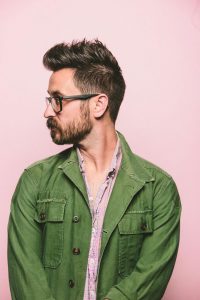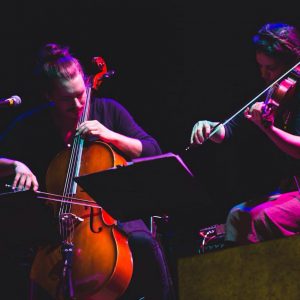By Denny Dyroff, Entertainment Editor, The Times
Many musicians trace their history of playing music back to the days of their early childhood – piano lessons when they were four years old or picking up a guitar at the age of six. Kiranavali Vidyasankar, who will perform in concert on March 17 at The Rotunda (4014 Walnut Street, Philadelphia, http://firemuseumpresents.com), takes it to a whole other level.
By age two, Kiranavali, who grew up in Chennai, India, was hailed as a child prodigy. She was able to identify over 200 ragas (melodic scales), demonstrate the 175 talas (rhythmic cycles) and answer numerous other technical questions pertaining to Carnatic music. The Indian Express (June 14, 1975) declared her to be “astounding in her precocity”, while The Hindu (June 1976) wrote, “More fantastic is the manner in which three-year old Kiranavali is able to tell the raga even at the commencement of its outline.”
Kiranavali’s father, Narasimhan, an outstanding musician and teacher, and son of the renowned Gotuvadyam Narayana Iyengar, saw Kiranavali’s potential even as a toddler and started training her in the intricacies of music.
“In India, we believe that babies can learn in the womb,” said Kiranavali, during a phone interview Thursday afternoon from her home in Montgomery County.
“My first brother Chitravina learned from my father and by age two-and-a-half could identify a lot of ragas.
“My father repeated the process with my second brother and me. While we were playing, he’d sing a phrase and say the name of the raga. Thus, we unconsciously learnt a lot of material before we got aware of the world around us. I now see that these things take 10-15 years for the average student.
“In Indian music, we give value to what feeling the music has. Also, I had exposure to my older brother’s singing and instrument practice. It was similar to how a child exposed to sport or TV learns.”
Under Narasimhan’s watchful guidance, Kiranavali grew from prodigy to confident musician. Her early performances were in tandem with her older brother Shashikiran. As a pair of bright young children, this unique brother-sister duo won much appreciation from connoisseurs, critics and the music-loving public. Both of them branched out as soloists during their teens.
“My first full concert was when I was 11 with Shashikiran,” said Kiranavali.
“My brother started studying with T Brinda in 1986 and I used to go to classes with him. After four-to-five years of this, one day she suddenly asked me to sing something. After I sang for her, she said — you come alone for classes henceforth. She was a big factor in my development – a big influence.”
T Brinda (Thanjavur Brinda), the grand-daughter of Vina Dhanammal, was a significant torchbearer of the finest Carnatic musical traditions. She was primarily a vocalist, although she also played the Vina. T Brinda, also known as Brindamma, was a great repository of some of the best Carnatic treasures. For nearly a decade, Kiranavali and her siblings assimilated a sizeable number of compositions of unparalleled quality in Brindamma’s repertoire.
“I was singing solo by the time I was 14-15,” said Kiranavali, who has lived in the Philadelphia area since 2005.
A few years later, Kiranavali began learning to play the chitravina, an ancient South Indian slide instrument her family is famous for, and started pursuing it with great passion. Within a span of two years, she made rapid strides on the instrument that not only allowed her to team up with Ravikiran but also allowed her to perform solo at many prestigious venues in India such as The Music Academy (Chennai), Krishna Gana Sabha (Chennai) and Sri Shanmukhananda Fine Arts (Mumbai).
“The chitravina was always in the family,” said Kiranavali. “Until age 17, I wasn’t very keen on taking it up. After seeing me play, my father and whoever heard me, said I had a good touch for it. After two years, I was ready to start performing. I already had music in me. I can play the chitravina with a lot of flair, but it so happens that I get more invitations for vocal performances.”
In Hindustani music (classical music of North India), ragas are categorized by the time of day in which they are performed. There are dawn ragas, morning ragas, afternoon ragas, early evening ragas, late evening ragas, night ragas and late night ragas. South Indian Carnatic music is different.
“In South Indian music, we don’t have the concept of ragas based on the time of day,” said Kiranavali. “The mood of the raga can be changed with the way you sing it. Before I perform, I look at the feel of the hall and the audience and that sometimes influences me. I do want to present music in the right way. My classical context and content are things I will never dilute.”
The rich musical environment in which she grew up, the thorough training from her illustrious gurus, the many years of hard work and good work ethic, have sharpened Kiranavali’s innate talent and keen musical acumen. Some of her notable works include “Lakshmi Prabhavam,” a special dance production in which she was a lead singer, and her much-acclaimed concert featuring a single piece in 101 and 108 ragas respectively.
She is the first Carnatic musician to win prestigious project and educator grants from The Pew Center for Arts & Heritage (2014) and the Pennsylvania Council on the Arts (2014 & 2016). She was invited by the University of Pennsylvania to spearhead a Carnatic music performance course and has been a Professional Associate there since Spring 2016.
“In my show this Sunday, I’ll be accompanied by violin and two mridangams,” said Kiranavali. “I’ve decided on some of the ragas and have an idea of what I’d like to sing. I will also have a student singing along with me.”
Video link for Kiranavali – https://youtu.be/9dVbTmH2uh0.
The show at The Rotunda will start at 5 p.m. Admission is free, but a donation is requested.
On March 16 Boot and Saddle (1131 South Broad Street, Philadelphia, 215-639-4528, www.bootandsaddlephilly.com) will host a show featuring two American singer/songwriter/guitarists whose early family life also influenced their musical paths – Sean McConnell and Caleb Elliott.
McConnell was born in Massachusetts to parents who both were folk singers.
“My parents were folksingers in the Boston area,” said McConnell, during a phone interview last week from a tour stop in Asbury Park, New Jersey.
“I grew up watching their gigs. I was also watching my dad – Greg McConnell – write songs. We were from the Marlboro/Hudson area. They took Boston and ran with it.”
His family moved to Georgia when he was 11 years old. Once his family relocated to the South, McConnell began playing guitar and writing his own songs.
“Moving to Georgia was a big change,” said McConnell. “As an 11-year-old, it was a jarring experience. The South was where I really started writing music.
“I stared writing when I was around 11 – after the move. Moving to a whole other area definitely stirred up a lot of emotions.
“I made my first record — ‘Faces’ — when I was 15. I had a guitar teacher names Steve Rick. He had a little studio where I recorded the CD. I started playing talent shows and coffee houses. As years went by, I just kept making music.”
In his late teens, McConnell moved from Georgia to Tennessee.
“I moved to Murfreesboro, Tennessee to go to college at Middle Tennessee State University,” said McConnell. “That’s what got me to Tennessee. I met my future wife in college. I started playing shows there and then signed a publishing deal.
“I split my time 50/50 between building my career and writing for other artists in the country world in Nashville. Writing for other people was a huge help. The royalties I got from those songs let me self-finance my own career. It was a blessing.
“Last year, I wrote my first Number One song with Brett Young. I also had a Top Four hit with Rascal Flatts. I also worked with Meat Loaf.”
The song with Brett Young was the chart-topping hit “Mercy” and the tune with Rascal Flatts was “Come Wake Me Up.” In 2012, Swedish country/pop female singer Jill Johnson featured “Come Wake Me Up” on her album “A Woman Can Change Her Mind.”
McConnell released his latest album “Secondhand Smoke” on February 8 via Big Picnic Records. Produced, recorded and written by McConnell in his Nashville home studio, “Secondhand Smoke” is a striking intimate portrait of life’s intricacies.
According to McConnell, “These are stories that people are familiar with. They steer the ship in a certain direction, then leave you off at this ocean of possibilities that we didn’t plan on the story taking us to.”
McConnell took his time making the album.
“I started recording in January last year,” said McConnell. “I worked on it two months straight and then did some touring. I spent another two-to-three months on it between touring. It was all done in my home studio in Nashville so there was no time clock clicking behind me.
“I’m always writing and creating. When I’m out on the road, I tend to write every day. When I start a song, I know if it’s for me or for other people.
“With the new album – for me, it was the topic of searching and life turning grey from black-and-white. There are spiritual undertones of mystery. Life definitely informs the art.
“The spiritual vibe is not something I planned. It just crept out of my consciousness. I was raised in a Catholic household. I’ve always had an interest in faith and the spiritual journey. I think this record is on the journey.”
Video link for Sean McConnell — https://youtu.be/V-B9Redp0xU.
Elliott’s childhood exposure to music was completely different.
According to a press release, “On his debut album “Forever to Fade,” Louisiana singer/songwriter Caleb Elliott tells his story, from preacher’s son in a cult-like religion to finding musical freedom in Muscle Shoals, Alabama.”
“It wasn’t really a cult-like religion,” said Elliott, during a phone interview last week from a tour stop in Asbury Park, New Jersey.
“I did grow up in a really strict, religious household. It had that fundamentalist, evangelical Christian vibe. My dad is a pastor. My mom and my sister were never allowed to wear make-up.
“I never listened to pop music when I was young. It was always religious or classical. My mom, my sister and I started looking for another church when I was around 12 or 13.
“The biggest miracle of the whole thing is that I’m not jaded by religion. Faith can be a beautiful thing.”
While growing up, Elliott may not have been exposed to the music of the time, but he was exposed to timeless music.
“My mom had each of us fur kids start on classical instruments in elementary school. I studied cello. I loved it but it wasn’t very creative.
“When I was 13, we were discovering new churches. We went to a Methodist church and they had electric guitar in the church band. Right then, I decided I wanted to play guitar.
“I found there was a guitar at home and got it restrung. I started writing songs and it took me a long time to get decent. My mom still made me practice cello for an hour before I could play electric guitar.
“By the time I was in college, life seemed pretty normal. I was a biology major at the University of Louisiana at Lafayette – the Ragin’ Cajuns. I was immersing myself into different music. Eventually, I got into Dylan and Neil Young.
“In my first year at college, I had no car. So, I holed up in my room with my electric guitar and played and played and played. In my second year at college, I got my first gig at Bisbano’s Pizza Parlor in Lafayette.
“I started getting a lot of covers up my sleeve. In my last two years at college, I was earning all my money doing cover songs.”
Eventually, Elliott’s musical journey took him to Muscle Shoals, Alabama.
“I released an EP of tunes in 2012 and it didn’t do anything,” said Elliott. “I did put cello on some of the tracks and then I started getting session gigs on cello.
“One night, I was at a show by Dylan LeBlanc and he invited me to sit in with him. After that, we became good friends and he invited me to go on tour with him. It was fun.
“Later in Muscle Shoals, I played on a record with him. After that, I played lot of session work with cello. I moved to Muscle Shoals in 2014.”
Elliott’s career progressed steadily and soon he was working on his own album.
“I got a lot of my songs I liked together and started making the album,” said Elliott. “I had a good rapport with the engineer on the album — Ben Tanner.”
Tanner, who is a respected producer and engineer, is a co-founder of Single Lock Records as well as the keyboardist for Alabama Shakes.
“Ben was associated with Single Lock Records and that led to me getting signed to the label,” said Elliott. “They released my ‘Forever to Fade’ album on March 8.”
Video link for Caleb Elliott — https://youtu.be/iaPgA6TsyQI.
The show at Boot and Saddle will start at 8:30 p.m. Tickets are $15.
Other upcoming shows at Boot and saddle are Sophie Auster on March 19 and Mike & The Moonpies on March 20.
 Now through March 17, Azuka Theatre (The Theaters at The Drake, 302 South Hicks Street, Philadelphia, http://azukatheatre.org/Bob-A-Life-In-Five-Acts) presents the return of the Virginia & Harvey Kimmel New Professionals Production with the Philadelphia Premiere of “Bob: A Life in Five Acts” by Peter Sinn Nachrieb.
Now through March 17, Azuka Theatre (The Theaters at The Drake, 302 South Hicks Street, Philadelphia, http://azukatheatre.org/Bob-A-Life-In-Five-Acts) presents the return of the Virginia & Harvey Kimmel New Professionals Production with the Philadelphia Premiere of “Bob: A Life in Five Acts” by Peter Sinn Nachrieb.
“Bob: A Life in Five Acts” is a grand tale that spans birth to death, from America to Mexico, with dozens of true American characters along the way.
The play chronicles the highly unusual life of Bob and his lifelong quest to become a “Great Man.” The play is a comedic exploration of American mythology and values, the treacherous pursuit of happiness, and discovering what it means to be truly “great.” This everyman tale is directed by Michael Osinski, who previously directed Azuka’s “Moth.”
“This is a play I directed a few years ago for a student group at the University of Pennsylvania,” said Osinski, during a recent phone interview.
“Bob is born in the restroom at a White Castle. He doesn’t always go about things the right way. This play is about his entire life.
“It starts with his birth on the bathroom floor of a fast food restaurant and covers 70-80 years – his whole life. He was on a road trip until age 12 and lived at rest stops until he was 18.
“The play picks certain crucial periods where he has to make a decision in his life.”
Bob does not lead a run-of-the-mill existence.
“At one rest stop, Bob meets a woman he falls in love with,” said Osinski. “Act 3 is when he’s 30. He keeps a list of things he wants to do. When he is 30, he reaches a point where he can’t take it anymore. He keeps disappointing himself and other people. Later in the play, Bob takes a darker turn.
“In Act 4, he is 50 years old and is a selfish miser. Act 5 is the epilogue. We meet all the characters he has encountered in his life. Finally, when he’s 70, he is peace with himself.”
This production features the rising talent of Paul Harrold, Sabriaya Shipley, Frank Jimenez, Claris Park and Dan D’Albis.
The set features a large map of the United States. Actors will use found objects and magically pull props from areas on set the audience didn’t know existed.
According to Osinski, “It will resemble a live action illustrated story book for adults.”
Azuka continues its pay-what-you-decide model for this show where audiences are invited to experience the art on stage and pay what they think it is worth after. “Bob” runs 120 minutes with one intermission and is recommended for audiences 15-and-older.









